Understanding insomnia is essential today since millions of people throughout the world, 50 to 70 million people in the USA alone, struggle with insomnia, a sleep disorder marked by trouble getting asleep, staying asleep, or having non-restorative sleep. In contrast to brief periods of insomnia, chronic insomnia can have a significant negative influence on both physical and mental health.
We look into the causes, risk factors, symptoms, and diagnosis of insomnia in this extensive investigation. We also discuss the potential hazards of long-term usage of sleep medications while looking at the many treatment alternatives, such as lifestyle changes, counseling, and medicine.
Additionally, we look into how insomnia affects productivity, everyday functioning, and general quality of life, frequently interacting with mental health issues like anxiety and depression. We seek to offer helpful insights into controlling and treating insomnia by looking at evidence-based tactics, food and lifestyle changes, and the function of cognitive-behavioral therapy.
Disclaimer:
This post on Insomnia is not intended to treat or cure any disease via medication. Expert opinion to educate with natural general information for the people who have normal health and want to live healthy for long. Here the methods are not substituted for the medical advice of your doctor or any other healthcare professional.
Also, this post may contain affiliate links, which means I may receive a thin commission, at no cost to you, if you buy through the link. Learn more in the disclaimer.
We also talk about how technology, screen time, and exposure to blue light affect sleep patterns, how different age groups are affected by insomnia, and the potential long-term impacts of untreated insomnia on health and well-being.
Finally, we discuss the connection between chronic pain and sleeplessness and provide methods for treating insomnia in people who have chronic pain. Along the way, we'll also cover useful sleep hygiene tips and relaxation methods that can help people with insomnia enhance both the quantity and quality of their rest.
Since overcoming Insomnia might be your personal growth challenge as well. So, let's take a look into the step-by-step discussion for a safe a secure life.
Understanding Insomnia: Causes, Effects, and Sleep Remedy
Here's a set of Vital Points on Insomnia:
1. Insomnia: How It Differs from Occasional Sleeplessness
What is insomnia? And how does it differ from occasional sleeplessness?
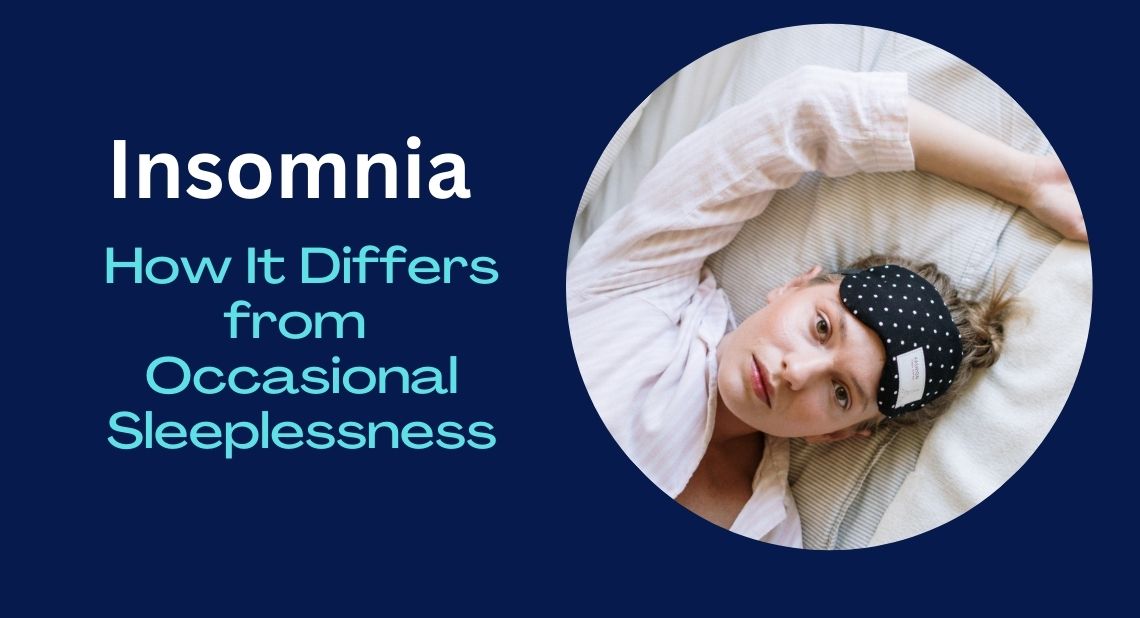
Despite having enough opportunity for sleep, insomnia is a sleep condition marked by difficulties falling asleep, remaining asleep, or having non-restorative sleep. It is a chronic ailment that can significantly affect a person's ability to function on a day-to-day basis and general well-being.
Contrarily, brief periods of trouble falling asleep can occur from a variety of causes, including stress, jet lag, illness, or transient disturbances in the sleep environment. Most people suffer occasional sleeplessness at some point in their life, which is common and typically goes away on its own without needing any special care.
The frequency and persistence of sleep problems are what distinguish chronic insomnia from briefcases of sleeplessness. A chronic condition is insomnia, which lasts for at least three nights a week and at least three months. It frequently develops into a pattern, resulting in ongoing sleep difficulties and daily impairments.
On the other hand, infrequent insomnia is sporadic and usually goes away after the root issue or trigger is resolved.
Sleeping disorders like insomnia frequently come with a variety of symptoms. It includes:
- difficulty initiating sleep,
- frequent awakenings during the night,
- waking up too early in the morning,
- feeling unrefreshed upon waking,
- daytime sleepiness,
- fatigue,
- irritability,
- difficulty concentrating, and
- impaired cognitive performance.
The general functioning, emotions, and quality of life of an individual can all be greatly impacted by these symptoms.
It's important to keep in mind that sporadic sleeplessness might occasionally cause a temporary change in sleep patterns that may mirror symptoms of insomnia.
The duration and durability of sleep problems, however, serve as the primary differentiator. The presence of insomnia may be indicated if the sleep issues linger after the first trigger or occur frequently.
A healthcare practitioner should be consulted if you have ongoing sleep problems or believe you may have insomnia to receive a thorough assessment and discuss your treatment choices.
2. Common causes and risk factors associated with insomnia
Discuss the common causes and risk factors associated with Insomnia.
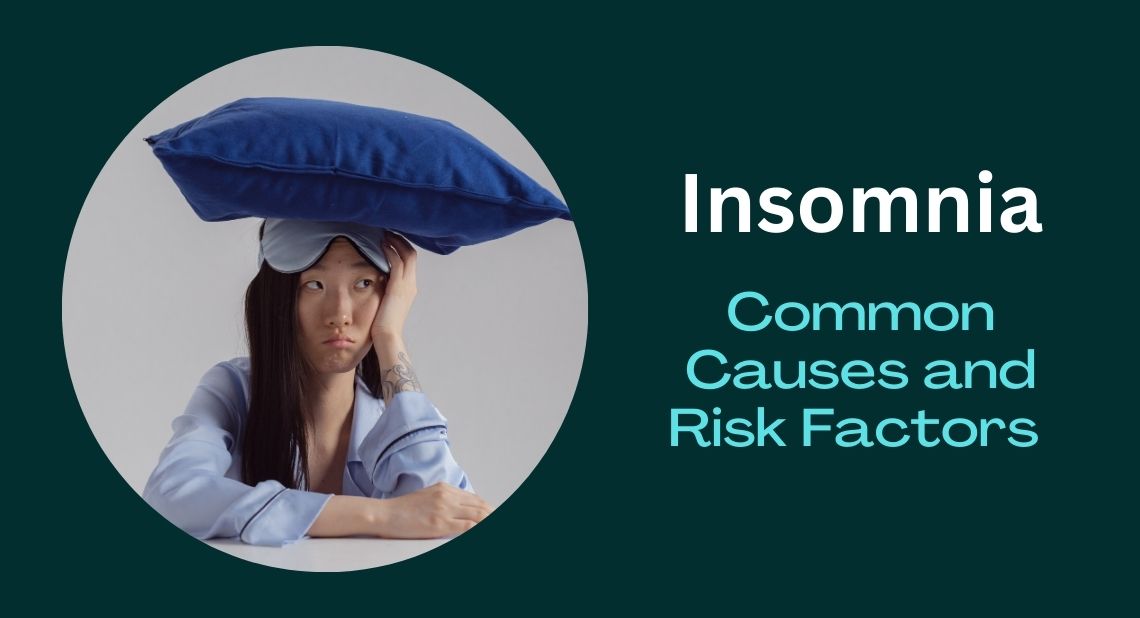
Numerous intrinsic (internal) and extrinsic (external) risk factors as well as other factors might contribute to insomnia.
To pinpoint the root causes of insomnia and create effective treatment plans, it is crucial to comprehend these causes and risk factors.
Here are some common causes and risk factors associated with insomnia:
- Stress and Anxiety: Psychological factors, such as excessive stress, worry, or anxiety, are common causes of insomnia. Racing thoughts and an overactive mind can make it difficult to relax and fall asleep.
- Depression and Mental Health Disorders: Generalized anxiety disorder (GAD), post-traumatic stress disorder (PTSD), and depression are among the mental health disorders that frequently accompany insomnia.
- Medical Conditions: Various medical conditions can contribute to the development of insomnia, including chronic pain conditions (e.g., arthritis, fibromyalgia), respiratory disorders (e.g., asthma, sleep apnea), gastrointestinal disorders (e.g., acid reflux), neurological disorders (e.g., Parkinson's disease, Alzheimer's disease), and hormonal imbalances (e.g., menopause, thyroid disorders).
- Medications and Substances: Antidepressants, corticosteroids, and medicines containing stimulants are just a few examples of drugs that might disrupt sleep and cause insomnia. The usage of drugs like caffeine, nicotine, and alcohol can also interfere with sleep cycles.
- Poor Sleep Hygiene: Irregular sleep schedules, inconsistent bedtime routines, excessive napping, stimulating activities before bedtime (e.g., using electronic devices, watching TV), and sleeping in an uncomfortable environment can all contribute to insomnia.
- Lifestyle Factors: Poor eating and exercise habits, excessive coffee and energy drink intake, and irregular sleep-wake cycles (such as shift work) are all unhealthy lifestyle behaviors that can interrupt sleep and raise the risk of insomnia.
- Age and Gender: Insomnia can occur at any age, but it is more prevalent in older adults. Hormonal changes during menopause in women can also increase the likelihood of sleep disturbances and insomnia.
- Genetics and Family History: Given that insomnia can run in families, there may be a hereditary susceptibility to it. A person's sleep-wake cycle may be impacted by specific genetic variants, increasing their risk of developing sleep issues.
- Environmental Factors: Noisy or uncomfortable sleep environments, excessive light exposure (especially blue light from electronic devices), extreme temperatures, and disruptions in the sleep environment (e.g., frequent travel, and shift changes) can all contribute to insomnia.
It's crucial to remember that these causes and risk factors may interact and that having several of them may make insomnia more likely to occur.
A healthcare practitioner can assist in determining the underlying causes and creating a suitable treatment plan if you are having persistent sleep problems.
3. The Impact of Chronic Insomnia on an Individual's Physical and Mental Health.
Explore the impact of chronic insomnia on an individual's physical and mental health.
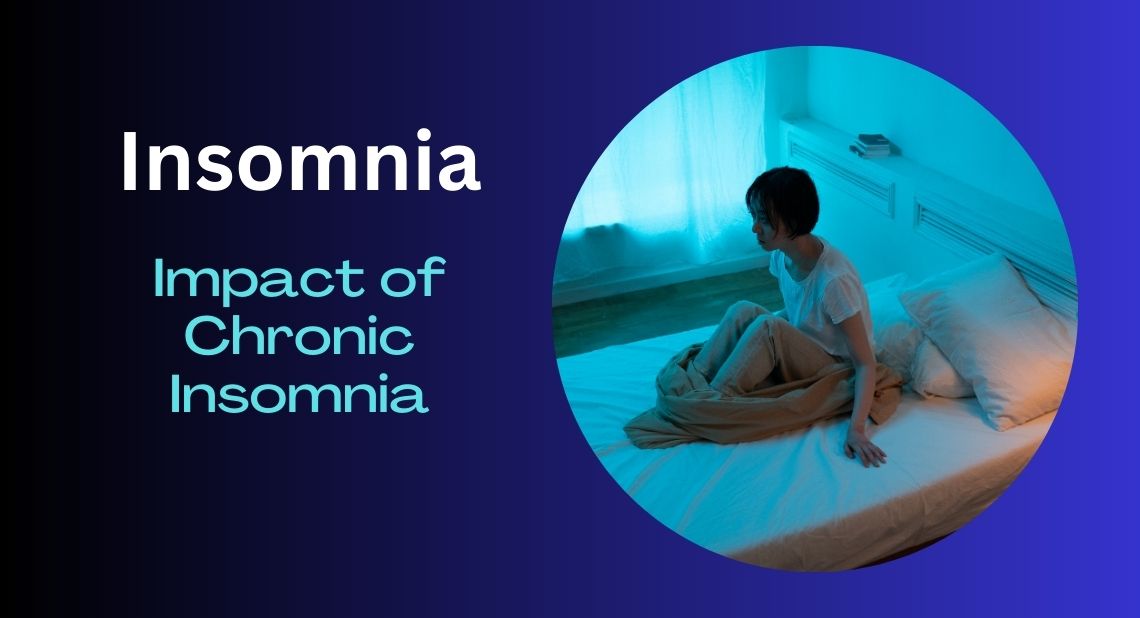
Both physical and mental health may be significantly impacted by chronic insomnia, which is characterized by persistent trouble going asleep, remaining asleep, or having non-restorative sleep.
Here's an exploration of the effects of chronic insomnia on individuals:
(1) Physical Health:
(a) Fatigue and Lack of Energy: Persistent exhaustion and a lack of energy throughout the day are common side effects of insomnia. This may affect daily activities and physical performance, as well as productivity.
(b) Weakened Immune System: People with persistent sleep problems may have a weakened immune system, which makes them more vulnerable to infections, diseases, and a slower rate of recovery.
(c) Increased Risk of Chronic Conditions: According to research, chronic disorders like cardiovascular disease, hypertension, diabetes, obesity, and chronic pain issues are more likely to develop in people who have insomnia.
(d) Altered Hormonal Balance: The delicate hormonal balance in the body can be upset by insomnia, which could result in hormonal abnormalities that could have an impact on metabolism, reproductive health, and general well-being.
(e) Impaired Cognitive Functioning: Cognitive impairments, such as issues with memory, attention, focus, problem-solving, and decision-making, can arise from insufficient sleep as a result of insomnia.
(2) Mental Health:
(a) Increased Risk of Mental Health Disorders: The onset of mental health issues such as anxiety disorders, depression, bipolar disorder, and substance addiction disorders is closely linked to chronic sleeplessness.
(b) Worsening of Existing Mental Health Conditions: Insomnia can exacerbate the symptoms of pre-existing mental health conditions, leading to increased severity and reduced response to treatment.
(c) Emotional Disturbances: Chronic insomnia, which results in sleep loss, has been linked to emotional instability, irritability, mood swings, and increased emotional reactivity.
(d) Impaired Stress Coping Mechanisms: Lack of sufficient sleep weakens the body's ability to handle stress effectively, making individuals more susceptible to stress-related disorders and reducing resilience.
(e) Impaired Quality of Life: Chronic insomnia can significantly impact an individual's overall quality of life, leading to decreased satisfaction, social withdrawal, reduced productivity, and strained interpersonal relationships.
It is crucial to understand that there is a symbiotic relationship between chronic insomnia and both physical and mental health. While physical and mental health disorders can cause or exacerbate insomnia, they can also make it worse, leading to a vicious cycle of sleep difficulties and health issues.
Chronic insomnia can be treated, which not only eases sleep issues but also significantly enhances both physical and mental health. The adoption of appropriate sleep hygiene practices, cognitive-behavioral therapy for insomnia (CBT-I), medication, and other effective treatment alternatives can be obtained by consulting with healthcare professionals who specialize in treating sleep disorders.
4. Some Common Symptoms of Insomnia and How are They Diagnosed
What are some common symptoms of insomnia and how are they diagnosed?
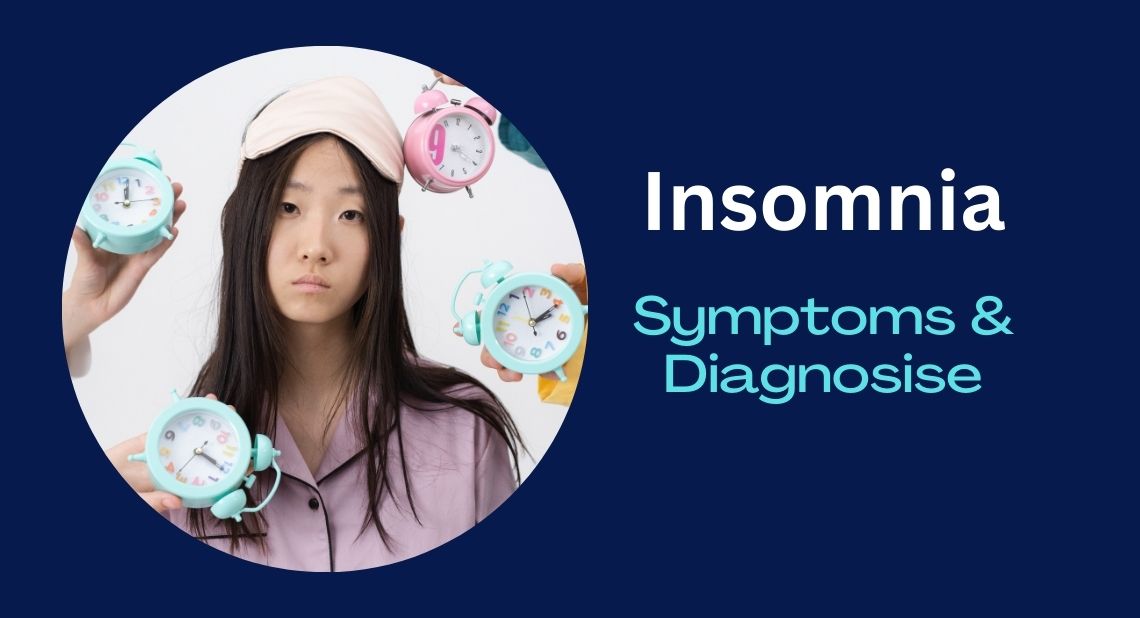
It's time to diagnose the issues to heal Insomnia
Insomnia is typically characterized by a range of symptoms related to sleep difficulties. The common symptoms of insomnia include:
- Difficulty falling asleep: People with insomnia frequently have trouble getting to sleep and may lie in bed for a long time before finally nodding off.
- Difficulty staying asleep: People with insomnia may experience frequent awakenings during the night, finding it challenging to maintain continuous sleep throughout the night.
- Waking up too early: People with insomnia may experience early awakenings and trouble falling back asleep, which shortens their amount of sleep.
- Non-restorative sleep: Despite spending enough time in bed, individuals with insomnia often wake up feeling unrefreshed and still fatigued, as if they haven't had a restful sleep.
- Daytime sleepiness and fatigue: Chronic insomnia can result in excessive daytime sleepiness, exhaustion, and a lack of vitality.
- Difficulty concentrating and impaired cognitive function: Insomnia can negatively affect cognitive abilities, resulting in difficulties with concentration, memory, attention, and problem-solving.
- Mood disturbances: Insomnia frequently has a detrimental impact on emotional well-being and is linked to mood disorders like irritability, anxiety, and depression.
To diagnose insomnia, healthcare professionals typically rely on a comprehensive assessment that includes:
- Clinical Evaluation: A healthcare provider will conduct a detailed medical history interview to understand the individual's sleep patterns, symptoms, and potential underlying causes of insomnia. They may also ask about lifestyle factors, stress levels, and any co-existing medical or psychiatric conditions.
- Sleep Diary: Keeping a sleep diary for a couple of weeks can help track sleep patterns and provide valuable information about sleep-wake schedules, sleep quality, and daytime functioning.
- Sleep Assessment Tools: Healthcare professionals may use standardized questionnaires or rating scales to assess the severity of insomnia symptoms, the impact on daily life, and associated daytime impairments.
- Medical Examination: In some cases, a physical examination or specific medical tests may be conducted to rule out any underlying medical conditions that could be contributing to sleep difficulties.
For an accurate diagnosis of insomnia, speak with a medical practitioner or a sleep specialist. They can assess the person's symptoms, assess the severity of insomnia and how it affects everyday functioning, and then create a treatment plan that is suitable for their requirements.
5. Various Treatment Options Available for Insomnia
Discussion of the various treatment options available for insomnia, including lifestyle changes, therapy, and medication
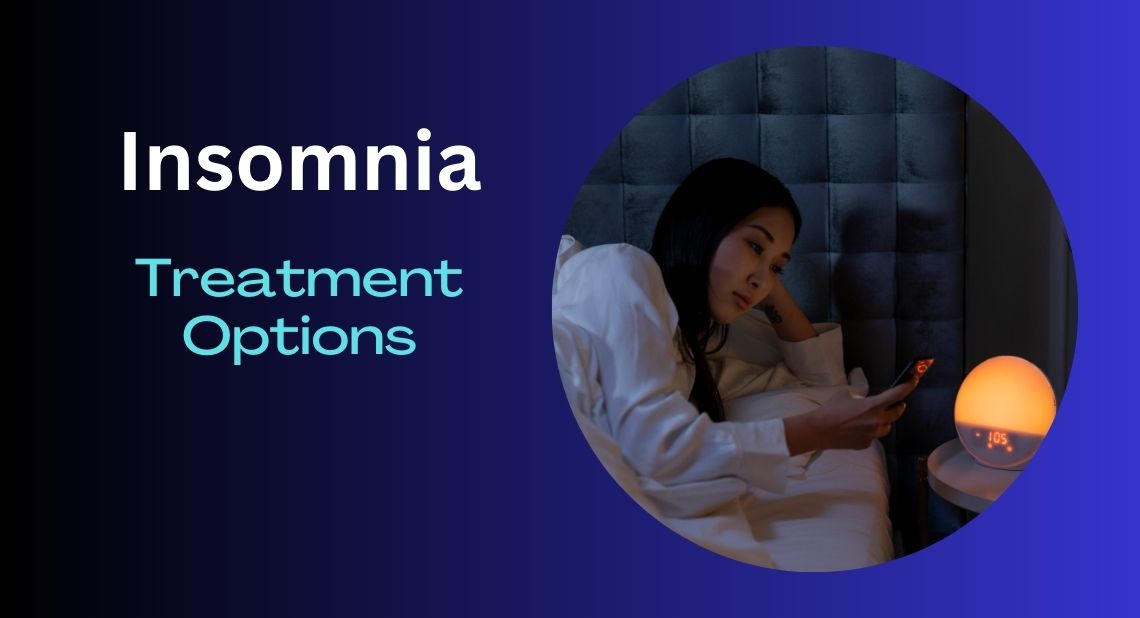
Pick a most effective option that heals.
The treatment of insomnia typically involves a combination of approaches that address underlying causes, promote healthy sleep habits, and target symptoms directly. Here are various treatment options available for insomnia:
1. Lifestyle Changes
(a) Sleep Hygiene: Adopting routines that encourage healthy sleep, such as keeping a regular sleep schedule, providing a relaxing sleeping environment, avoiding stimulating activities before bed, and limiting exposure to electronic gadgets, are all examples of excellent sleep hygiene.
(b) Regular Exercise: Engaging in regular physical activity during the day can help regulate sleep-wake cycles and promote better sleep quality. However, it is advisable to avoid intense exercise close to bedtime, as it may interfere with sleep.
(c) Limit Stimulants: Caffeine, nicotine, and alcohol should be consumed in moderation or not at all before bedtime because they can interfere with sleep cycles.
(d) Stress Management: Techniques such as relaxation exercises, meditation, deep breathing, and mindfulness can help reduce stress levels and promote better sleep.
2. Cognitive-Behavioral Therapy for Insomnia (CBT-I)
CBT-I is a highly effective, evidence-based therapy for treating insomnia. It aims to identify and modify thoughts, behaviors, and beliefs that contribute to sleep difficulties.
CBT-I may include techniques such as sleep restriction therapy, stimulus control therapy, cognitive restructuring, and relaxation training. It helps individuals develop healthier sleep habits, address negative thought patterns, and establish a more positive association with sleep.
3. Medications
a. Over-the-Counter Sleep Aids: These are short-term options that can be used to alleviate acute insomnia. Common examples include antihistamines that induce drowsiness. However, they should be used cautiously and under the guidance of a healthcare professional due to potential side effects and dependence.
b. Prescription Sleep Medications: In some cases, healthcare providers may prescribe sleep medications, such as benzodiazepines or non-benzodiazepine hypnotics, for short-term use. These medications can help initiate and maintain sleep, but they come with potential side effects and risk of dependence.
c. Melatonin: Melatonin is a hormone that regulates the sleep-wake cycle. It is available as an over-the-counter supplement and can be used to regulate sleep patterns, particularly in individuals with circadian rhythm disorders.
4. Complementary and Alternative Therapies
Acupuncture, herbal supplements (such as valerian root and chamomile), aromatherapy, and relaxation methods like yoga and massage are among complementary therapies that some people find helpful. Before attempting any alternative therapies, it is vital to speak with a healthcare practitioner because there is insufficient evidence to support their efficacy in treating insomnia.
It's worth noting that the choice of treatment depends on the severity of insomnia, underlying causes, individual preferences, and the guidance of healthcare professionals. A comprehensive evaluation by a healthcare provider or sleep specialist can help determine the most appropriate treatment plan for an individual's specific needs.
6. Potential Side Effects and Risks
Explore the potential side effects and risks associated with long-term use of sleep medications.
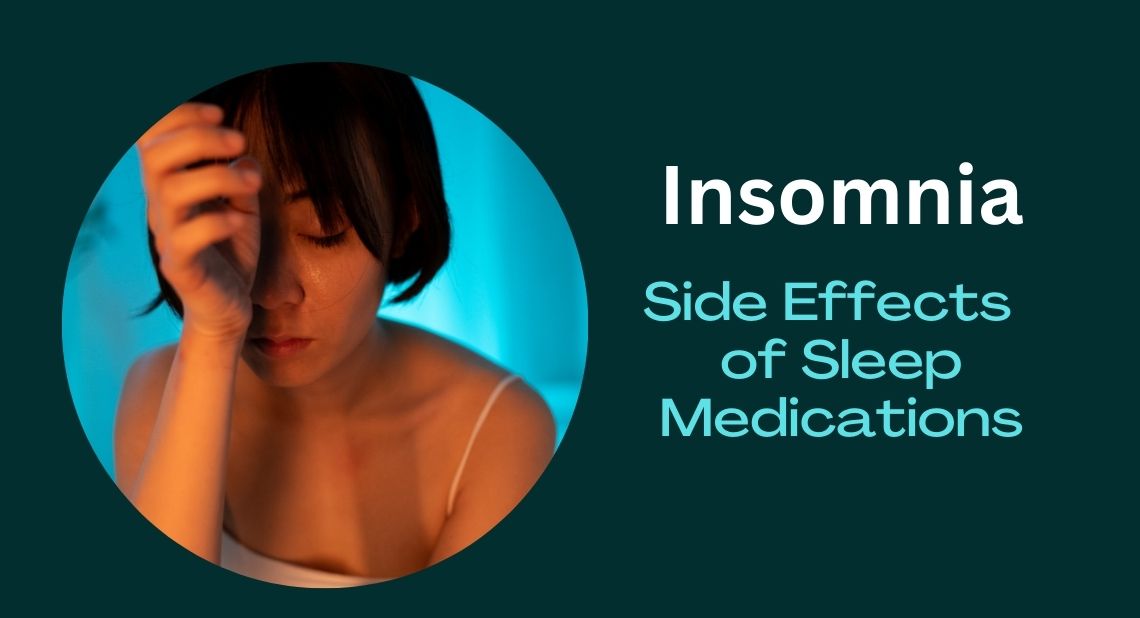
Long-term use of sleep medications, such as benzodiazepines and non-benzodiazepine hypnotics, should be carefully considered due to the potential side effects and risks involved. Here are some key considerations:
- Dependency and Tolerance: Long-term use of sleep aids can cause dependence, which means the body adapts to the drug and greater doses may be required to produce the same sleep-inducing effect. This may lead to tolerance, where the drug loses its effectiveness over time and needs higher doses to have the desired effect.
- Withdrawal Symptoms: After prolonged use, withdrawal symptoms may occur if sleep medication is abruptly stopped or dosed down. Rebound insomnia (a worsening of sleep problems), anxiety, irritability, tremors, sweating, and in severe cases, seizures, can all be among these symptoms.
- Cognitive Impairment and Daytime Drowsiness: Sleep medications can cause residual daytime sedation, resulting in impaired cognitive function, decreased alertness, reduced reaction time, and an increased risk of accidents or falls.
- Memory and Attention Issues: Memory issues and issues with attention and concentration have been linked to the long-term use of sleep aids, particularly benzodiazepines.
- Drug Interactions: Sleep medications can interact with other medications or substances, including alcohol, potentially intensifying their effects and increasing the risk of adverse reactions.
- Risk of Overdose: The danger of an unintentional overdose, which can result in respiratory depression, loss of consciousness, and even death, increases when sleep medicines are used, especially in higher dosages or in conjunction with other sedatives.
- Complex Sleep Behaviors: Rarely, sleep medications may cause individuals to engage in complex behaviors while partially asleep, such as sleepwalking, sleep driving, or sleep eating, without recollection of waking.
- Falls and Fractures: Particularly in older persons, sleep medicines can raise the risk of falls, which can result in fractures and other injuries.
It's important to note that sleep medications may be appropriate for short-term use in certain situations, such as during acute episodes of insomnia or when other treatments have been ineffective.
They are often not advised for long-term usage as the main form of treatment for persistent insomnia, though. It is essential to carefully follow the healthcare provider's instructions, utilize the lowest effective dose, and periodically reevaluate the necessity for continuous use of sleep drugs if they are prescribed.
Working closely with a healthcare provider or sleep expert can help reduce risks and identify alternate strategies for managing insomnia over time, such as cognitive-behavioral therapy for insomnia (CBT-I) or addressing underlying causes through lifestyle changes.
7. Insomnia Affects Daily Functioning, Productivity, and Overall Quality of Life
How does insomnia affect daily functioning, productivity, and overall quality of life?
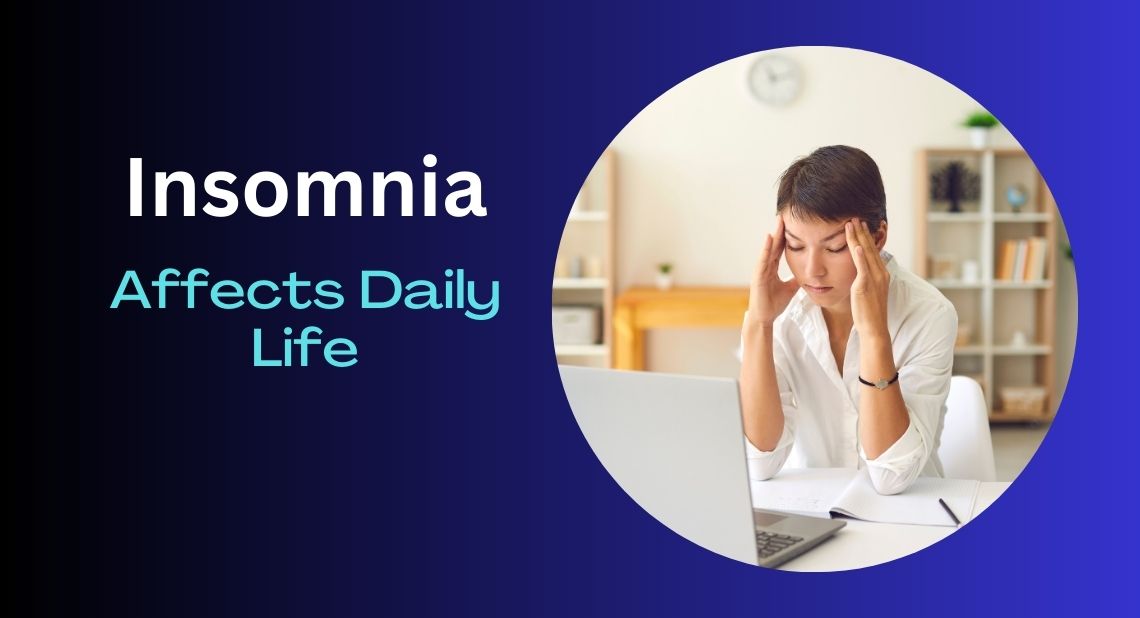
Insomnia can significantly impact an individual's daily functioning, productivity, and overall quality of life. Here are some ways in which insomnia can affect these areas:
- Impaired Cognitive Functioning: Problems with memory, concentration, attention, and problem-solving can result from insomnia. People may have less mental clarity, slower processing, and lower cognitive function, which might make it harder for them to complete activities successfully.
- Decreased Productivity: The persistent lack of quality sleep due to insomnia can result in reduced productivity and performance in various areas of life, including work, academics, and personal responsibilities. Individuals may find it challenging to stay focused, complete tasks efficiently, and meet deadlines.
- Daytime Sleepiness and Fatigue: The effects of insomnia frequently include extreme daytime sleepiness and a pervasive sense of exhaustion. This can make it challenging for people to stay awake and interested throughout the day, which can influence their performance, capacity for concentration, and general functioning.
- Mood Disturbances: A higher chance of developing mood disorders including anxiety and depression as well as mood disturbances like irritability, mood swings, and heightened emotional reactivity are all linked to insomnia. Relationships, social interactions, and general emotional health may all be impacted by these emotional changes.
- Impact on Physical Health: Chronic insomnia is linked to various physical health problems, including an increased risk of cardiovascular diseases, hypertension, obesity, and metabolic disorders. Sleep deprivation caused by insomnia can weaken the immune system, making individuals more susceptible to infections and illnesses.
- Interpersonal and Social Impact: Insomnia can strain relationships and social interactions. The irritability, mood changes, and decreased energy associated with insomnia can affect communication, emotional connection, and overall interaction with others. Individuals with insomnia may withdraw from social activities and experience a decreased quality of relationships.
- Reduced Quality of Life: The total quality of life of an individual might be considerably lowered by insomnia. A decreased sense of well-being, happiness, and pleasure in life can be attributed to ongoing sleep problems, daytime impairments, cognitive issues, and emotional disorders.
It's critical to understand how insomnia affects everyday functioning and general quality of life. Individuals with insomnia can improve their sleep patterns, improve daytime functioning, and regain a higher quality of life by seeking the right treatment and management techniques, such as improving sleep hygiene, going to therapy, addressing underlying causes, and forming healthy lifestyle habits.
8. Link Between Insomnia and Mental Health Conditions
Discuss the link between insomnia and mental health conditions such as anxiety and depression.
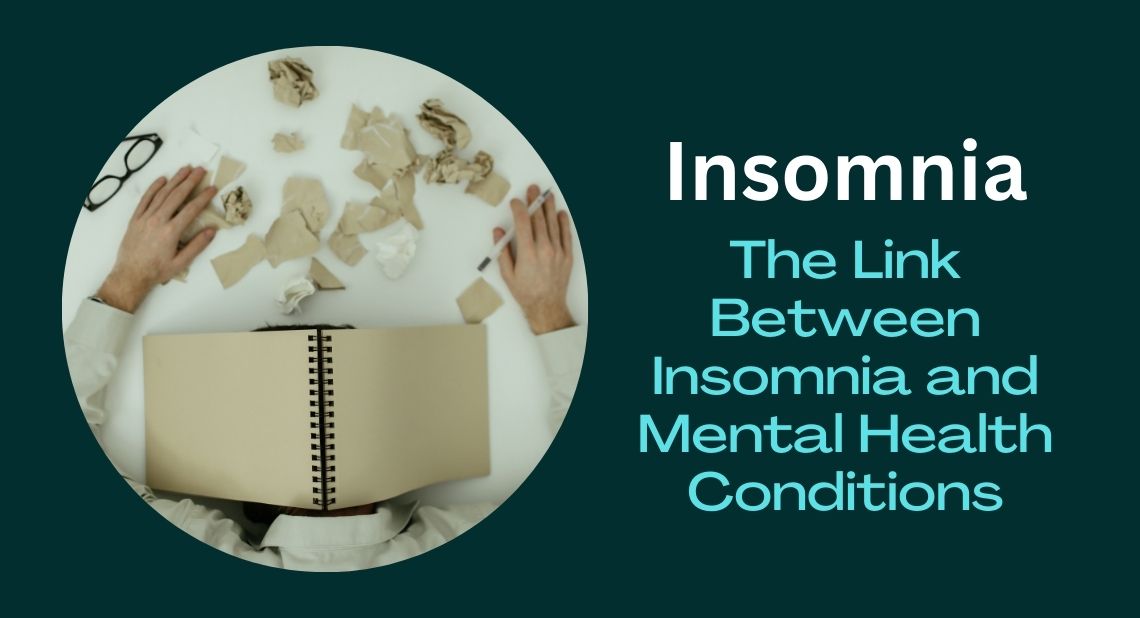
Insomnia and mental health conditions, particularly anxiety and depression, are closely interconnected. There is a bidirectional relationship between insomnia and these disorders, with each influencing and exacerbating the other. Here's a discussion of the link between insomnia and mental health conditions:
1. Anxiety and Insomnia
a. Heightened Arousal: Anxiety is often associated with increased physiological arousal and hyperarousal of the mind. This heightened state of alertness can make it difficult for individuals to relax and fall asleep, leading to insomnia.
b. Rumination and Worry: Anxiety disorders frequently involve persistent worry, rumination, and intrusive thoughts. These cognitive processes can occupy the mind, making it challenging to quiet the thoughts and initiate sleep.
c. Sleep Disturbances as a Symptom: Insomnia is a common symptom of anxiety disorders. Sleep disturbances, such as difficulty falling asleep, staying asleep, or non-restorative sleep, may manifest alongside other anxiety symptoms.
d. The cycle of Anxiety and Insomnia: The presence of insomnia can intensify anxiety symptoms, as sleep deprivation contributes to increased irritability, reduced coping mechanisms, and heightened sensitivity to stressors. This, in turn, can perpetuate the cycle of anxiety and insomnia.
2. Depression and Insomnia
(a) Sleep Onset and Maintenance: Insomnia is a prevalent symptom of depression, characterized by difficulty falling asleep and staying asleep throughout the night. Individuals with depression may experience early morning awakenings and find it challenging to return to sleep.
(b) Altered Sleep Architecture: Depressive disorders can disrupt normal sleep architecture, leading to changes in REM (rapid eye movement) sleep, deep sleep, and overall sleep quality. This results in non-restorative sleep and a sense of unrefreshing sleep.
(c) Negative Thinking Patterns: Depressive symptoms, such as negative thoughts, hopelessness, and rumination, can keep individuals awake and contribute to insomnia. Persistent negative thinking during nighttime hours can further exacerbate depressive symptoms.
(d) Reciprocal Relationship: Insomnia and depression can form a cyclical relationship. Insomnia can increase the risk of developing or worsening depression, while depression can perpetuate and exacerbate insomnia symptoms.
3. Impact on Treatment Outcomes
Insomnia can also influence the treatment outcomes of anxiety and depression. Sleep disturbances, if left unaddressed, can make it more challenging to effectively manage anxiety and depression symptoms.
Additionally, the presence of insomnia may reduce the response to treatment interventions, such as psychotherapy or pharmacotherapy, for anxiety and depression.
Given the strong link between insomnia and mental health conditions, addressing sleep disturbances is crucial in the comprehensive management of anxiety and depression.
Treating insomnia alongside anxiety or depression often involves a multimodal approach, including cognitive-behavioral therapy for insomnia (CBT-I), medication when appropriate, and addressing underlying causes and triggers.
It's crucial for people who are experiencing symptoms of anxiety, sadness, or insomnia to get support from medical specialists or mental health experts. They can provide a thorough evaluation, a precise diagnosis, and the creation of a customized treatment program that treats both the underlying mental health issue and the resulting insomnia.
9. Certain Dietary and Lifestyle Changes to Improve Sleep Quality
Can certain dietary and lifestyle changes improve sleep quality and help alleviate insomnia? Discuss evidence-based strategies.

It works since our body is chemical
Some dietary and lifestyle adjustments can improve sleep quality and aid with insomnia. Here are some evidence-based strategies:
1. Maintain a Consistent Sleep Schedule
Even on weekends, maintaining a consistent sleep-wake pattern supports greater sleep quality by helping to regulate the body's internal clock. Setting regular wake-up and bedtimes helps teach the body to adhere to a natural sleep schedule.
2. Create a Sleep-Friendly Environment
Ensure your sleep environment is conducive to sleep. Keep your bedroom dark, quiet, and cool. Use comfortable bedding, and supportive pillows, and consider using earplugs, eye masks, or white noise machines to block out external disturbances.
3. Limit Stimulants
Avoid or consume just a little amount of stimulants like caffeine, nicotine, and alcohol, especially right before night. These things can make it more difficult to fall asleep and disrupt your sleep.
4. Promote Relaxation Before Bed
Establish a relaxing pre-sleep routine to signal the body and mind that it's time to unwind. This can include activities like reading a book, taking a warm bath, practicing relaxation techniques (e.g., deep breathing, meditation), or gentle stretching.
5. Regular Physical Activity
Regularly move your body throughout the day, preferably in the morning. Exercise encourages better sleep, lowers stress levels, and improves general well-being. However, avoid strenuous exercise right before bed because it might disrupt your sleep.
6. Watch Your Diet:
(a) Balanced Meals: Maintain a balanced diet that includes a variety of fruits, vegetables, whole grains, lean proteins, and healthy fats. Proper nutrition supports overall health, which can positively impact sleep quality.
(b) Evening Meal Timing: Avoid heavy, spicy, or large meals close to bedtime, as they can cause discomfort and disrupt sleep. Opt for lighter, easily digestible meals.
(c) Sleep-Inducing Foods: Some foods contain sleep-promoting properties, such as tryptophan (found in turkey, nuts, and seeds) and foods rich in magnesium (such as spinach, legumes, and whole grains). Including these healthy foods in your evening meal or as a bedtime snack may be beneficial.
7. Manage Stress:
High-stress levels can contribute to insomnia. Explore stress management techniques like mindfulness meditation, breathing exercise, journaling, or engaging in activities that help you relax and unwind.
8. Limit Screen Time Before Bed
The blue light emitted by electronic devices (such as smartphones, tablets, and computers) can disrupt the production of melatonin, a hormone that regulates sleep. Limit screen time at least an hour before bedtime or use blue light filters or glasses.
9. Seek Cognitive-Behavioral Therapy for Insomnia (CBT-I)
CBT-I is a highly effective, evidence-based therapy that targets the underlying causes and behaviors contributing to insomnia. It helps individuals develop healthier sleep habits, address negative thought patterns, and establish a positive association with sleep.
You may learn more about the 33 Sleep Habits Can Boost Your Immunity for Safe Health. It's crucial to remember that every person will react differently to dietary and lifestyle changes. To examine your unique circumstances, get tailored recommendations, and make sure these tactics are suitable for you, it is advised that you speak with a healthcare expert or sleep specialist.
10. The Role of Cognitive-behavioral Therapy for Insomnia (CBT-I)
Explore the role of cognitive-behavioral therapy for insomnia (CBT-I) in managing and treating sleep disturbances.
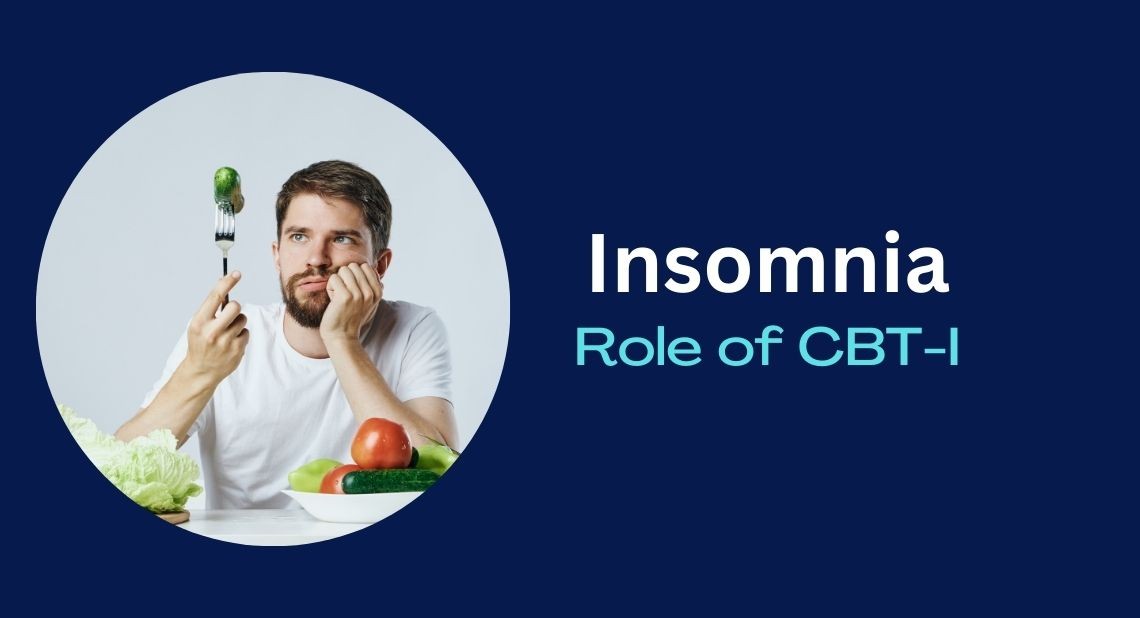
Cognitive-behavioral therapy for insomnia
A highly efficient and evidence-based method for managing and treating sleep disorders, particularly chronic insomnia, is cognitive-behavioral therapy for insomnia (CBT-I). It focuses on dealing with the underlying causes, ideas, actions, and feelings that cause insomnia. To encourage wholesome sleep practices and enhance the quality of sleep, CBT-I integrates several therapeutic strategies.
Here's an exploration of the role of CBT-I:
1. Sleep Education
Giving people accurate information about sleep, good sleep habits, and typical sleeping patterns is the first step in CBT-I. People can set reasonable expectations and clear up misconceptions about sleep by having a basic understanding of sleep physiology and the elements that affect sleep.
2. Stimulus Control Therapy
This CBT-I element seeks to create a solid connection between the bed and sleep. It entails establishing a regular sleep schedule, connecting the bedroom and bed with sleep (rather than alertness or anxiety), and solely utilizing the bed for sleeping and engaging in sexual activities. Eliminating sleep-interfering habits like spending extended amounts of time in bed awake or doing stimulating activities in bed will assist.
3. Sleep Restriction Therapy
Sleep restriction is designed to increase sleep efficiency and consolidate sleep. It involves temporarily limiting the time spent in bed to match the individual's actual sleep duration. Gradually, the time in bed is increased as sleep efficiency improves. This technique helps build a stronger sleep drive and improves the quality and efficiency of sleep.
4. Cognitive Restructuring
CBT-I addresses negative thoughts, worries, and anxieties about sleep through cognitive restructuring techniques. It helps individuals identify and challenge unhelpful beliefs and thoughts that perpetuate insomnia. By replacing negative thoughts with more positive and realistic ones, individuals can reduce anxiety and create a more positive association with sleep.
5. Relaxation Techniques
Relaxation training, which includes methods like progressive muscle relaxation, deep breathing exercises, and mindfulness meditation, is frequently incorporated into CBT-I. These methods aid people in calming their bodies and minds, lowering stress and anxiety, and establishing a sleep-friendly environment.
6. Sleep Hygiene
CBT-I emphasizes the importance of adopting healthy sleep hygiene practices. This includes maintaining a consistent sleep schedule, creating a comfortable sleep environment, avoiding stimulating activities before bedtime, limiting exposure to electronic devices, and managing factors such as noise and light that can impact sleep quality.
7. Maintenance and Relapse Prevention
Strategies for preserving the gains made and avoiding relapse are frequently included in CBT-I. This may entail continuing to monitor sleep patterns, attending routine follow-up appointments, and learning coping mechanisms to deal with potential sleep difficulties in the future.
CBT-I is usually delivered by trained therapists in individual or group settings. It has demonstrated long-term effectiveness in improving sleep quality, reducing insomnia symptoms, and enhancing daytime functioning. It is considered the first-line treatment for chronic insomnia and is recommended by various clinical guidelines.
It's important to remember that CBT-I is a structured, time-limited therapy that calls for individuals' active involvement and dedication. To get the right advice, individualized care, and support throughout the process, working with a certified healthcare practitioner or sleep specialist educated in CBT-I is crucial.
11. The impact of Technology, Screen Time, and Blue Light Exposure
Discuss the impact of technology, screen time, and blue light exposure on sleep patterns and Insomnia.
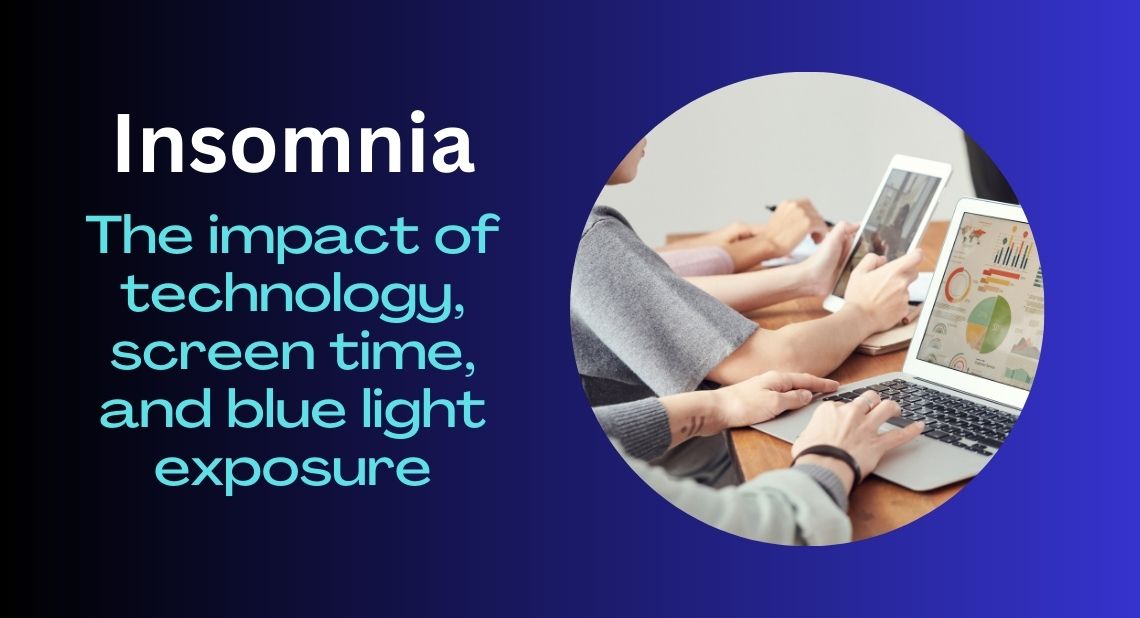
Technology, screen time, and blue light exposure can have a significant impact on sleep patterns and contribute to the development or exacerbation of insomnia. Here's a discussion of their impact:
1. Blue Light and Sleep Disruption
In comparison to other light wavelengths, blue light, which is emitted by electronic gadgets like smartphones, tablets, laptops, and televisions, has a short wavelength and a higher energy level. Blue light exposure in the evening or right before bed can inhibit the release of melatonin, a hormone that controls sleep-wake cycles, making it more challenging to get to sleep and stay asleep for the duration of the night.
2. Delayed Sleep Onset:
Engaging in screen time activities close to bedtime can delay the onset of sleep. The exposure to stimulating content, bright lights, and the interactive nature of electronic devices can keep the mind alert and make it harder to wind down for sleep.
3. Disrupted Circadian Rhythm
The circadian rhythm, also known as the "body clock," regulates various physiological processes, including sleep-wake cycles. Blue light exposure at night can disrupt the circadian rhythm by signaling the brain to stay awake, leading to sleep difficulties and irregular sleep patterns.
4. Reduced Melatonin Production
Melatonin, which is essential for encouraging sleepiness and regulating the sleep-wake cycle, is suppressed by exposure to blue light. A lack of melatonin might make it difficult to go to sleep, stay asleep, and have non-restorative sleep.
5. Increased Cognitive Stimulation
Engaging in stimulating activities on electronic devices, such as playing video games, browsing social media, or watching intense movies or shows, can increase cognitive stimulation and arousal. This can make it harder to relax the mind and transition into a state of calmness needed for sleep.
6. Psychological and Emotional Factors
Sleep-related psychological and emotional aspects can be influenced by email, social media, and Internet news. Arousal of the mind and emotions that interfere with sleep might be caused by emotional engagement, exposure to upsetting or anxiety-inducing material, or feeling under pressure to be continually connected.
7. Sleep Fragmentation
The presence of electronic devices in the bedroom can disrupt sleep through notifications, calls, or messages, leading to sleep fragmentation and interrupted sleep patterns. Even brief interruptions can impact the overall quality of sleep and contribute to insomnia symptoms.
To mitigate the impact of technology on sleep patterns and insomnia, consider the following strategies:
- Establish a "Digital Sunset": Set a specific time in the evening when electronic devices are turned off or put on "do not disturb" mode, allowing for a wind-down period before sleep.
- Use Blue Light Filters: To lessen evening exposure to blue light, turn on night mode or utilize applications that block blue light.
- Create a Tech-Free Bedroom: To reduce their presence and to fend against temptations for late-night screen time, keep electronic gadgets out of the bedroom or, at the very least, away from the bed.
- Practice Good Sleep Hygiene: Follow healthy sleep hygiene practices, such as establishing a consistent sleep schedule, creating a sleep-friendly environment, and engaging in relaxation techniques before bedtime.
- Opt for Alternative Activities: Instead of watching TV or playing video games before night, try doing something relaxing like reading a book, listening to quiet music, doing some breathing exercises, or journaling.
People may encourage greater sleep quality and sustain healthy sleep patterns by being aware of how technology and screen time affect sleep and by adopting mindful habits and boundaries.
12. Insomnia Affects Different Age Groups
How does insomnia affect different age groups, such as children, teenagers, adults, and the elderly?
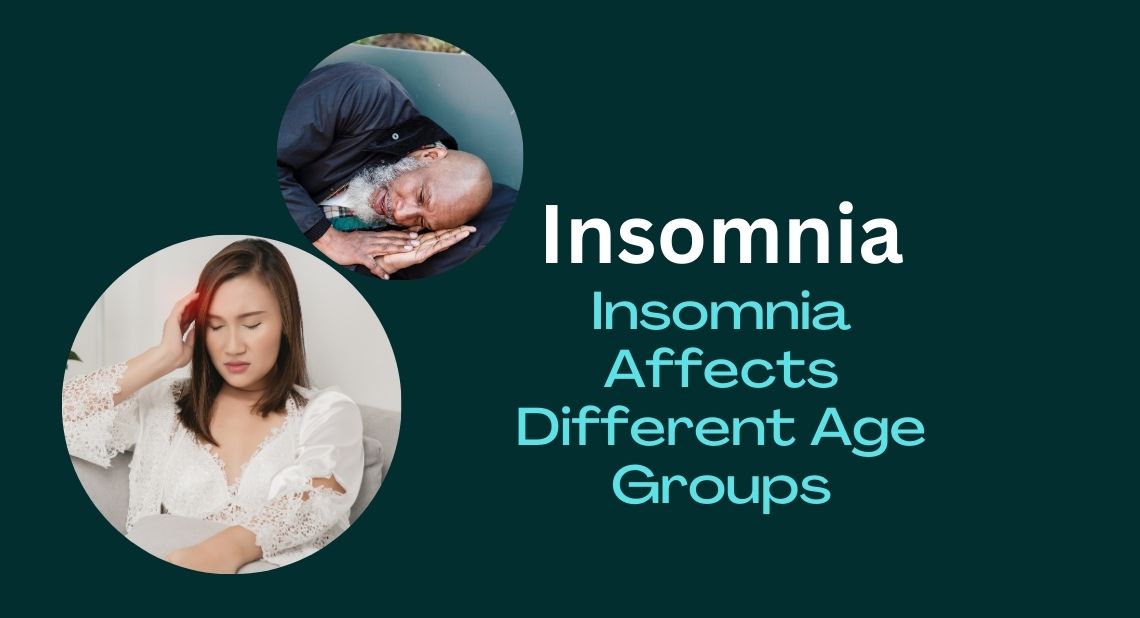
All age groups, including toddlers, teenagers, adults, and the elderly, are susceptible to insomnia. The causes, signs, and effects of insomnia, however, may change depending on the age group.
Here's an overview of how insomnia can impact each age group:
1. Children:
- Causes: Insomnia in children can be caused by various factors, including anxiety, bedtime resistance, changes in routine, excessive screen time, medical conditions, or environmental factors.
- Symptoms: Children with insomnia may have trouble getting asleep, wake up frequently during the night, refuse to go to bed, have nightmares, or feel sleepy during the day.
- Impact: Insomnia can lead to irritability, behavioral problems, poor school performance, attention difficulties, and impaired cognitive development in children.
2. Teenagers:
- Causes: Teenage insomnia can be brought on by things like scholastic stress, peer pressure, inconsistent sleep patterns, excessive use of electronics, caffeine use, or underlying mental health conditions.
- Symptoms: Teenagers with insomnia may struggle to fall asleep, have trouble staying asleep, experience restless or fragmented sleep, and may feel fatigued during the day.
- Impact: The likelihood of mental health conditions including sadness and anxiety is increased by insomnia, which can also have a poor effect on mood, concentration, academic performance, and decision-making skills.
3. Adults:
- Causes: Insomnia in adults can arise from various causes, including stress, work-related pressures, relationship difficulties, medical conditions, mental health disorders, lifestyle factors, or certain medications.
- Symptoms: Adults with insomnia may have trouble staying asleep, getting non-restorative sleep, or both. Throughout the day, they could experience fatigue, irritability, and problems with attention and memory.
- Impact: Daytime weariness, diminished cognitive function, decreased productivity at work, mood problems, an increased risk of accidents, and a higher chance of acquiring mental health conditions like anxiety and depression are all consequences of insomnia.
4. Elderly:
- Causes: Age-related changes, chronic medical illnesses, pain, drugs, lifestyle choices, modifications to the way they sleep, and increased sensitivity to environmental disturbances can all have an impact on senior people's insomnia.
- Symptoms: Elderly individuals with insomnia may experience difficulty initiating or maintaining sleep, waking up too early, experiencing fragmented sleep, or not feeling refreshed upon awakening.
- Impact: Insomnia in the elderly can exacerbate age-related health issues, contribute to cognitive decline, increase the risk of falls and accidents, impact quality of life, and be associated with higher rates of depression and anxiety.
It's vital to remember that each age group may require a different approach to the assessment, diagnosis, and management of insomnia. To guarantee proper assessment and customized treatment plans, it is advised to consult with healthcare professionals or sleep specialists with experience treating insomnia in particular age groups.
13.The Potential Long-term Consequences of Untreated Insomnia
Discuss the potential long-term consequences of untreated insomnia on overall health and well-being.
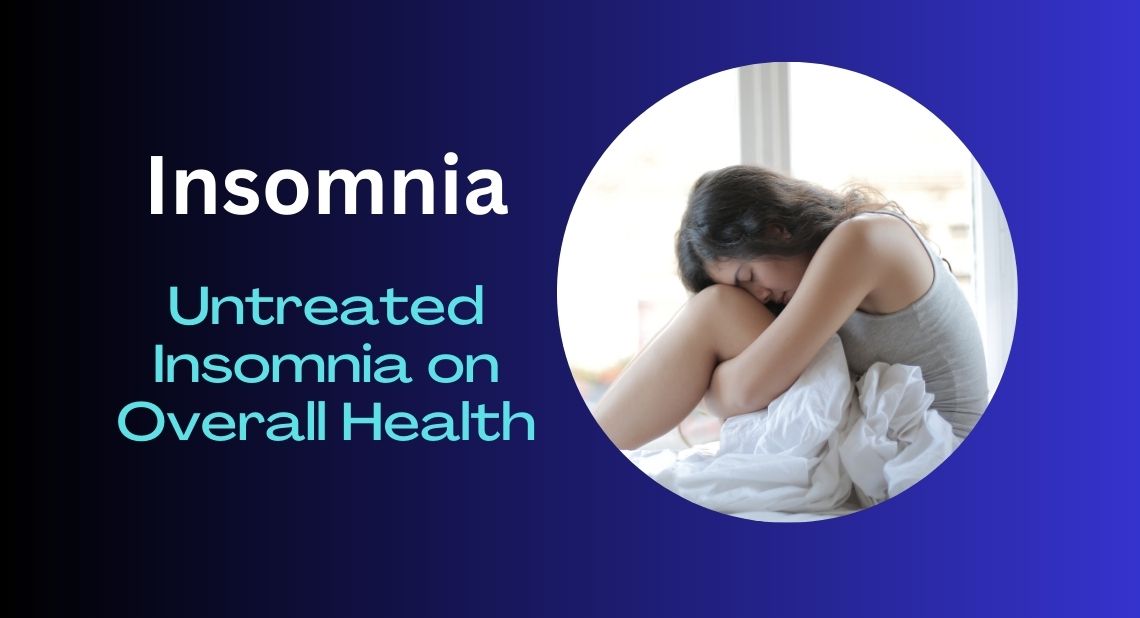
Insomnia deserves treatment at it's early stage!
Untreated insomnia can have significant long-term consequences on overall health and well-being. Here are some potential long-term effects:
1. Impaired Cognitive Function
Chronic insomnia can cause cognitive deficiencies, such as attention deficits, memory issues, short attention spans, and poor cognitive function. This may affect daily functioning, academic achievement, and work productivity.
2. Mental Health Disorders
The onset and worsening of mental health issues including depression and anxiety disorders are both highly correlated with insomnia. Consistent sleep problems can worsen symptoms, hasten the onset of mood disorders, and make remission more difficult to obtain.
4. Increased Risk of Chronic Medical Conditions
Long-term insomnia is linked to a higher risk of acquiring several chronic medical disorders, including diabetes, obesity, immune system dysregulation, and cardiovascular diseases (including hypertension, heart disease, and stroke). Inadequate restorative sleep and disrupted sleep patterns can harm general health by interfering with normal physiological functions.
5. Reduced Quality of Life
Insomnia can significantly diminish an individual's overall quality of life. Sleep deprivation and constant fatigue can impair physical, social, and emotional well-being. Insomnia can affect personal relationships, limit participation in social activities, and reduce the enjoyment of life.
6. Daytime Impairment and Accidents
Daytime sleepiness, weariness, and poor daytime functioning are all consequences of insomnia. Due to decreased awareness, slowed reaction times, and impaired decision-making, this can increase the likelihood of accidents, including motor vehicle accidents and occupational injuries.
7. Weakened Immune Function
Chronic insomnia can weaken the immune system, making individuals more susceptible to infections and prolonging recovery times. Inadequate sleep compromises the immune response, making it harder for the body to fight off pathogens and maintain optimal immune function.
8. Increased Pain Sensitivity
A higher chance of acquiring chronic pain disorders and increased pain sensitivity have both been associated with insomnia. Sleep issues can make it harder to successfully manage pain by lowering the pain threshold and aggravating pre-existing pain disorders.
9. Impact on Hormonal Regulation
Insufficient or poor-quality sleep can disrupt the regulation of various hormones in the body, such as cortisol (stress hormone), insulin (blood sugar regulation), and leptin and ghrelin (appetite regulation). These disruptions can contribute to weight gain, metabolic dysregulation, and an increased risk of obesity.
To lessen its long-term effects, insomnia must be addressed and treated. It is best to get professional assistance from medical professionals or sleep specialists who can assess the underlying causes, provide a suitable treatment plan, and offer support all along the way. Cognitive-behavioral therapy for insomnia (CBT-I), dietary changes, and, in some situations, pharmaceutical therapies are also possible forms of treatment.
14. Relationship Between Chronic Pain and Insomnia
Explore the relationship between chronic pain and insomnia, and strategies for managing sleep disturbances in individuals with chronic pain
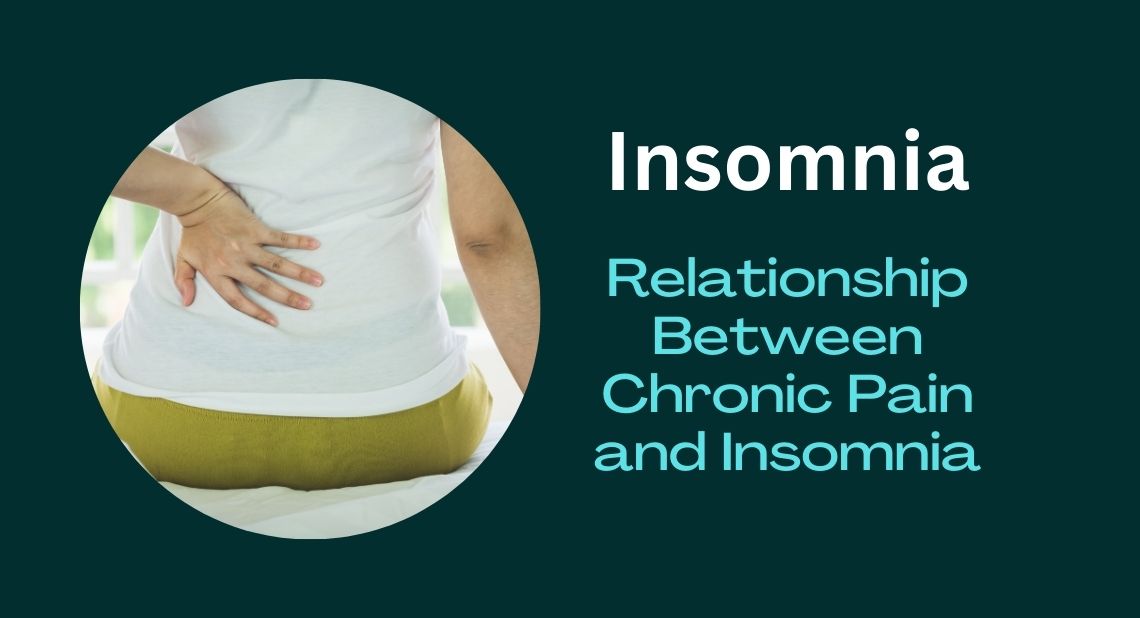
Insomnia and chronic pain frequently coexist and might have a complicated interaction. Sleep disturbances brought on by chronic pain problems might worsen pain perception and lower pain tolerance. For those with chronic pain, managing sleep disturbances is crucial to enhancing their general well-being.
Here's an exploration of the relationship between chronic pain and insomnia, along with strategies for managing sleep disturbances:
1. Impact of Chronic Pain on Sleep:
- Pain Interference: Pain can make it difficult to fall asleep and stay asleep, which results in interrupted sleep and poorer sleep quality.
- Hyperarousal: Chronic pain can cause a state of hyperarousal, making it challenging to relax and initiate sleep.
- Nighttime Pain: Pain symptoms may worsen at night, disrupting sleep and leading to awakenings.
2. Impact of Insomnia on Chronic Pain:
- Pain Perception: Sleep disturbances can heighten pain perception, making individuals more sensitive to pain stimuli.
- Pain Threshold: Inadequate sleep can lower the pain threshold and reduce pain tolerance, exacerbating the experience of chronic pain.
- Emotional Factors: A mood disorder caused by insomnia, such as worry or sadness, might increase the sense of pain.
Strategies for Managing Sleep Disturbances in Individuals with Chronic Pain:
1. Pain Management:
- Pain Medication: Consult with healthcare professionals to determine if pain medications can be used to alleviate pain symptoms, particularly before bedtime, to improve sleep quality.
- Alternative Pain Management Techniques: Explore non-pharmacological approaches, such as physical therapy, relaxation exercises, heat/cold therapy, acupuncture, or cognitive-behavioral therapies aimed at pain management, which can help reduce pain and improve sleep.
2. Sleep Environment:
- Comfortable Bedding: Invest in a supportive mattress, comfortable pillows, and bedding that promote a comfortable sleep environment.
- Temperature and Light Control: Maintain a cool, dark, and quiet sleep environment that minimizes external disturbances.
3. Sleep Hygiene Practices:
- Consistent Sleep Schedule: Establish a regular sleep schedule, going to bed and waking up at the same time each day, including weekends.
- Sleep-Friendly Pre-bed Routine: Engage in relaxing activities before bedtime, such as taking a warm bath, practicing relaxation techniques, or reading a calming book.
- Minimize Stimulants: Avoid caffeine, nicotine, and stimulating activities close to bedtime as they can interfere with sleep.
4. Cognitive-Behavioral Therapy for Insomnia (CBT-I):
- CBT-I is effective for individuals with chronic pain and insomnia. It addresses the thoughts, behaviors, and emotions related to sleep, pain, and anxiety, helping individuals develop healthier sleep habits and manage pain-related sleep disturbances.
5. Sleep Medications:
- Sleep medications may be considered in some cases, but their use should be carefully evaluated and monitored by healthcare professionals due to potential side effects and dependency risks.
6. Relaxation Techniques:
- Deep breathing exercises, progressive muscle relaxation, guided imagery, and mindfulness meditation can help individuals relax their body and mind, reducing pain-related tension and promoting sleep.
7. Psychological Support:
- Seek psychological support, such as therapy or counseling, to address emotional factors associated with chronic pain and insomnia. Cognitive-behavioral therapies can help individuals develop coping strategies and manage the psychological impact of pain on sleep.
To create a thorough treatment plan that covers both pain management and sleep disruptions, people with chronic pain and insomnia need to engage closely with medical professionals, such as pain specialists, sleep specialists, and therapists. Customized strategies are needed to suit the specific needs and challenges of each person's unique pain condition and sleeping patterns.
15. Some Effective Relaxation Techniques and Sleep Hygiene Practices
What are some effective relaxation techniques and sleep hygiene practices that can help individuals with Insomnia improve their sleep?
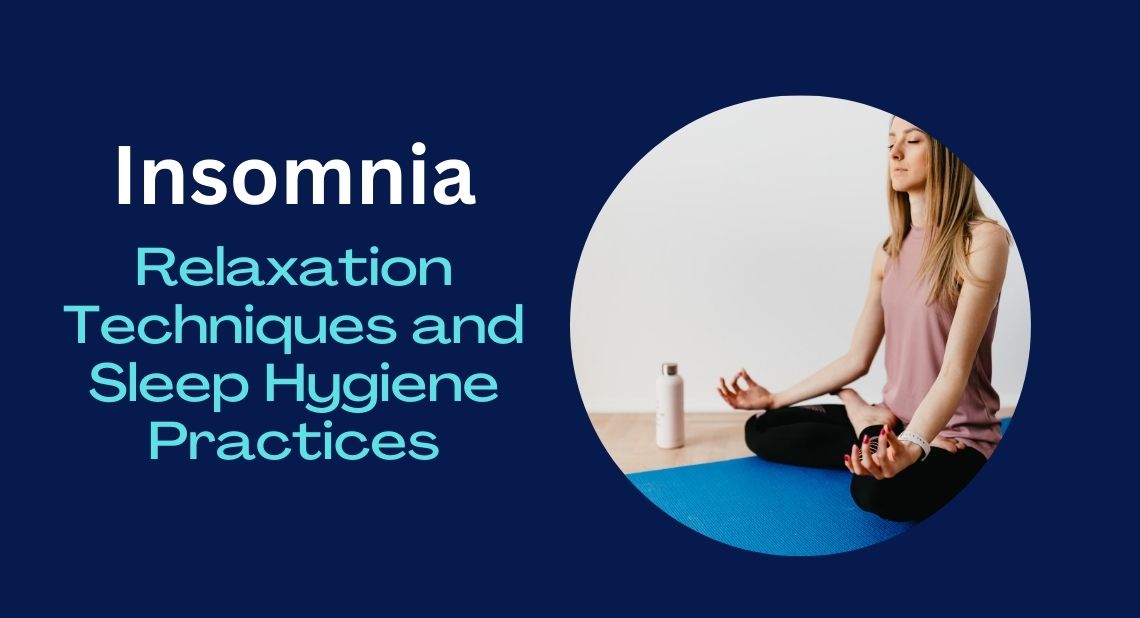
There are several effective relaxation techniques and sleep hygiene practices that can help individuals with insomnia improve their sleep. Here are some strategies to consider:
Relaxation Techniques:
- Progressive Muscle Relaxation (PMR): PMR involves tensing and then relaxing different muscle groups to promote physical relaxation and release tension. This technique can help individuals achieve a state of deep relaxation, making it easier to fall asleep.
- Deep Breathing Exercises: Deep breathing techniques, such as diaphragmatic breathing or the 4-7-8 breathing method, can help activate the body's relaxation response, reduce anxiety, and promote a sense of calmness conducive to sleep.
- Guided Imagery: Guided imagery involves creating vivid mental images of peaceful and calming scenes. By focusing on positive imagery, individuals can divert their attention from racing thoughts and promote relaxation and sleep.
- Mindfulness Meditation: Mindfulness meditation involves paying non-judgmental attention to the present moment. Practicing mindfulness can help calm the mind, reduce stress, and enhance sleep quality.
Sleep Hygiene Practices:
1. Consistent Sleep Schedule:
Establish a regular sleep schedule by going to bed and waking up at the same time every day, including weekends. Consistency helps regulate the body's internal clock and promotes better sleep.
2. Create a Sleep-Friendly Environment:
- Dark and Quiet: Ensure the sleep environment is dark, quiet, and free from distractions. Use blackout curtains, earplugs, or white noise machines if necessary.
- Comfortable Bedding: Invest in a comfortable mattress, supportive pillows, and breathable bedding to enhance comfort during sleep.
- Temperature Control: Maintain a cool and comfortable room temperature that promotes restful sleep.
3. Establish a Pre-Bed Routine:
Engage in a relaxing routine before bedtime to signal the body and mind that it's time to wind down. Activities can include taking a warm bath, reading a book, listening to calming music, or practicing relaxation techniques.
4. Limit Stimulants and Electronics:
- Caffeine and Nicotine: Avoid consuming caffeine (found in coffee, tea, soda, and chocolate) and nicotine, as they are stimulants that can interfere with sleep.
- Screen Time: Minimize exposure to electronic devices (such as smartphones, tablets, and laptops) before bedtime due to their blue light emission, which can disrupt sleep-inducing hormones.
5. Create a Worry Journal:
Before going to bed, jot down any concerns, worries, or racing thoughts in a journal. This can help unload the mind and provide a sense of closure, reducing bedtime anxieties.
6. Regular Physical Activity:
Engage in regular exercise during the day, preferably earlier in the day rather than close to bedtime. Regular physical activity promotes better sleep quality and helps reduce stress and anxiety.
7. Limit Napping:
If you have trouble sleeping at night, limit daytime napping or avoid it altogether to ensure that you are tired and ready for sleep at bedtime.
To find out what works best for you, it's important to try various relaxation techniques and sleep hygiene habits. Keep in mind that everyone has different sleep demands and preferences. Additionally, getting advice from a medical expert or sleep specialist can offer tailored suggestions and help for dealing with insomnia.
Conclusion
In conclusion, tackling the effects of insomnia on people's life requires an understanding of the condition. We have talked about the complexity of this sleep problem, its causes, risk factors, and implications on both physical and mental health. We have offered insights into properly controlling insomnia by looking at various treatment choices and taking into account the potential dangers of long-term pharmaceutical use.
Additionally, we have emphasized the significance of establishing appropriate sleep habits, changing one's lifestyle, and cognitive-behavioral treatment. We may take steps to lessen the effects of insomnia and enhance general well-being by realizing the connection between insomnia and mental health as well as the impact of variables like age and technology.
Insomnia Remedial Natural Products
Help You Get A Good Night's Sleep